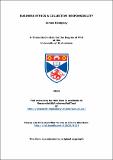Files in this item
Business ethics & collective responsibility
Item metadata
| dc.contributor.advisor | Cruft, Rowan | |
| dc.contributor.advisor | Mulgan, Tim | |
| dc.contributor.author | Dempsey, James A. | |
| dc.coverage.spatial | 174 | en_US |
| dc.date.accessioned | 2013-10-29T11:44:37Z | |
| dc.date.available | 2013-10-29T11:44:37Z | |
| dc.date.issued | 2013-11-30 | |
| dc.identifier.uri | https://hdl.handle.net/10023/4121 | |
| dc.description.abstract | The idea that ‘business ethics’ picks out a distinct discipline within ethical theory is contentious; in particular, it is unclear why theoretical approaches to moral and political philosophy cannot satisfactorily address ethical concerns in the context of business activity, just as they can in the context of other human activities. In response, I argue that some features of the business environment require more focused analysis than currently available. This environment is characterised by the presence of large social groups – business organisations – that are not political in nature, but yet wield considerable power and are the vehicles for complex forms of collective action. The most pressing ethical concern raised by such collective action is collective moral responsibility. I develop an account of collective responsibility that is tailored to business organisations and that combines a number of strands of moral thought – a desert-based account of moral responsibility that is of a kind with that typically applied to individual humans; a pluralistic account of how collective responsibility is generated that is rooted in irreducible group-level properties; and a moderate approach to social ontology that sees nothing mysterious in ‘distinct’ collective entities. From this starting point I develop two detailed models that illustrate how business organisations can constitute distinct collective entities that may be held morally responsible. The first shows how such organisations may satisfy the conditions required to hold moral agency, which is typically assumed to be a prerequisite for moral responsibility. The second breaks with this tradition and argues for the possibility of ‘non-agential’ moral responsibility in cases where complex organisational structures mediate the actions of the moral agents that populate them. I conclude by showing how this distinct organisational-level responsibility, far from insulating organisation members from personal culpability, illustrates quite distinct standards against which such individuals may be judged. | en_US |
| dc.language.iso | en | en_US |
| dc.publisher | University of St Andrews | |
| dc.subject | Philosophy | en_US |
| dc.subject | Business ethics | en_US |
| dc.subject | Applied ethics | en_US |
| dc.subject | Ethics | en_US |
| dc.subject | Moral philosophy | en_US |
| dc.subject | Collective responsibility | en_US |
| dc.subject | Responsibility | en_US |
| dc.subject | Organisations | en_US |
| dc.subject | Organisational ethics | en_US |
| dc.subject | Business | en_US |
| dc.subject | Collective agency | en_US |
| dc.subject | Group agency | en_US |
| dc.subject.lcc | BJ1725.D46 | |
| dc.subject.lcsh | Business ethics | en_US |
| dc.subject.lcsh | Applied ethics | en_US |
| dc.subject.lcsh | Business enterprises--Moral and ethical aspects | en_US |
| dc.subject.lcsh | Responsibility | en_US |
| dc.subject.lcsh | Agent (Philosophy) | en_US |
| dc.title | Business ethics & collective responsibility | en_US |
| dc.type | Thesis | en_US |
| dc.type.qualificationlevel | Doctoral | en_US |
| dc.type.qualificationname | PhD Doctor of Philosophy | en_US |
| dc.publisher.institution | The University of St Andrews | en_US |
| dc.publisher.department | The University of Stirling | en_US |
This item appears in the following Collection(s)
Items in the St Andrews Research Repository are protected by copyright, with all rights reserved, unless otherwise indicated.

